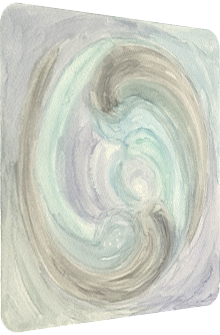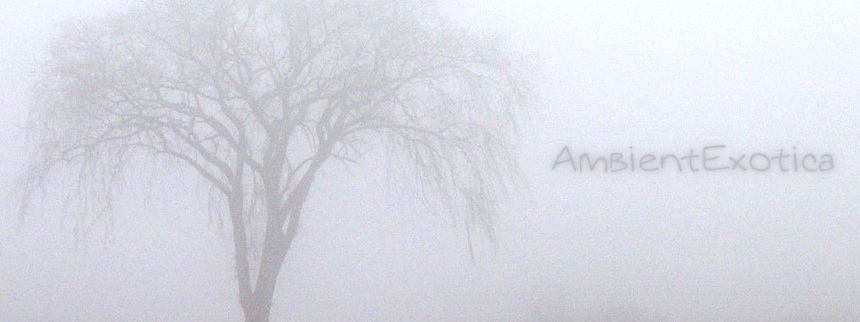
Tired Wires
Hark
2013
“Unsettling music with a sense of hope.” This short synopsis of Toronto-based multi-instrumentalist Joshua Cwintal aka Tired Wires' five-track debut EP Hark is one he has coined himself, but which neglects to reveal an astonishing conclusion that is – nomen est omen – reserved for the conclusive paragraph of this review. Released in August 2013 in a digital edition and in form of a tape on Already Dead Tapes & Records, it is available to purchase and stream at Bandcamp. The EP showcases the look and feel of an overview, a concentration of the artist's talent, preferred style and his skills of arranging; poignantly enough, it features a track called The Luthier which was created back in November 2012 and only available digitally heretofore. It so happens that stringed instruments and the almost mandatory classic piano meet gaseous drone cloudlets that could or could not be based on processed real-world instruments. All five tracks have something in common: they are seemingly sepia-toned, hopelessly coated in nostalgia and wadded in outlooks of better days to come. Dark Ambient Hark is not, since a certain incandescence is emanated in each composition. The perception of entering a holy alcove where every found sound and hidden vinyl-based appendix has reigned for eternity and ad infinitum is immediately imposed right in the first track, and from this point of ingress onwards, benign, softly sweeping drone formations meander through the cavities and antra. I have hinted at a surprising revelation, and if I am not totally off track, it is one of the most impressive, though soft and fragile, twists I have ever encountered in the realms of Ambient or Drone music. It's no Boards of Canada-esque guessing game, but a nice gesture and self-involved nod after all. But enough of these teasers and drum rolls, here is a meticulous look at Tired Wires' debut Hark.
An ecclesiastic opening phase with – careful, paradox – gently distorted guitar runlets and reverberated afterglows which are thrown back by the virtual walls that imply a large cavity or cathedral, The Cartographer is the gateway to the Moebius-like macro patterns of Joshua Cwintal's innermost aesthetics. Organ-oid interstices fill in and illuminate the hazier sections, lessening the feeling of contemplation via diffuse light. Vitreous vesicles, ligneous chimes and rotatory bumblebee blebs round off a curious opener, one which is keen on displaying a progression but whose runtime is too short to let the celestial blur unfold majestically. Progression is poised to fail regardless, as the EP is about constancy and cohesion, if not in a single track's endemics, then by means of the complete physiognomy consisting of five compositions. Up next is the title track; Hark builds an incredibly wadded p(a)lace and functions as a Drone piece running on all cylinders. Oscillating between Ulf Lohmann's two-minded ethereal-forsaken Pop Ambient formula and a second dichotomy based on the simultaneity of aeriform swirls and aqueous encapsulation processes, Hark enchants with its thick superimposition, a wave-like imbalance between warm bliss and glacial countermovements, and finally a cautious movement towards cyberspace-oriented lands. This is Joshua Cwintal's most electronic submission, a haze brûlée if you will.
The third track Murmur is the prototypical piano arrangement that, if you ask me, appears on one too many EP's and related works nowadays. A melody of some form played on a recognizable piano is deemed essential and must appear in an Ambient artist's monographic show – or aural vernissage – in order to showcase the ability to cover the electro-acoustic fields of the ever-spreading Postmodern Classical genre. Tired Wires, in a more than poignant way, harks back to the recently rediscovered trend. The piano is in the spotlight, for it is the nucleus itself. Gyrating around higher, frostier pitches and staggering low frequency chords of droning warmth, it is the applied filters that embellish the minimalism. A hall effect that resembles a pressure box is just one amendment. There are, in addition, multitudinous auroral sirens near the piano aorta. They tumble between two principal schools of thought in terms of electronic music, the aforementioned electronic-airborne and the acoustic-earthen approaches. Murmur is the EP's Achilles heel, still classy, definitely maintaining the coherence and hence fitting, but too arbitrary and bland in the given flood of other pianist's works.
The three-minute piece The Archivist is a favorite of mine, captivating qua its concurrency of incompatible (re)sources. A hammering cane is embedded in a helix of cloudy, nostalgic drone washes above which a flute melody is towering. Hovering over the sylvan-silkened turmoil, inheriting freedom and spawning rapture, the flute contains vestiges of the Hauntology movement. On the one hand, it is eldritch and eerie during some phases, like a harbinger of a pernicious portent to come, but on the other hand, it all of a sudden sports loftiness and a genuine fragility which implicitly asks the listening subject to cherish it. The Archivist, at the end of the day, is about the reconcilable excitement and joys which occur during a modus operandi that is foreign and alienating to many a desultory yolo swagger, but is astutely enough my favorite tune, as mentioned above. The finale is called The Luthier, a quasi long-form piece that was first released as a single track in November 2012 and sees Tired Wires' EP fade out with a particularly bosky diorama of cello-resembling tendrils and flute-evoking supplementary rhizomes whose luminescence lights the piano-undermined coppice. Hued in hatched colors in lieu of pastel foils, the brownish, unpretentiously soil-like impression is built via deeper tone sequences, a celebratory solemnity which is less based on pompousness rather than independence by means of interdependence. Space-Age laser coils and brazen spirals are the only cosmic instances in an otherwise enchanted chaparral, and I could leave it at that, were it not for the track title. A luthier builds and tunes up violins, and this suggests the use of a violin or related stringed instrument in this piece. If this is indeed the case, it is not used prominently, as the instrument is heavily processed, with its fibers – or sinews – occasionally peeking through the bittersweet fog banks.
Unsettling but coated in an alkaline alloy of warmth, Hark is that famous example of a positively – and oxymoronically – retrograde flow of nostalgic petrification. Everything seems to be influx: the warm synth patterns, the occasional pointillistic percussion elements, the stringed instruments and piano prongs as well as the celestial pseudo-monotony of the centroid drones. However, these cascades do not lead to a state of conclusion, heck, they do not even offer a sort of denouement, but lead back to the original starting point in a circular pattern. What sounds horrific concept-wise, with implicit allusions to the eternally repetitious tasks of Sisyphos or even the bittersweet cinematic daily routine of Bill Murray, turns out to be a place of shelter, if not for each and every listener, then even more so for Tired Wires aka Joshua Cwintal. Naturally, the crux of the matter is that this is not necessarily the real Joshua Cwintal, but a portrayal or gestalt of him, as every student in the field of literary studies would be willing to explicate. Please bear with me for a moment: it turns out that the whole EP could well encapsulate the work process and approach of the artist. In a poignant way, The Cartographer and The Archivist describe the approach of Joshua Cwintal best, they are self-explanatory for the things the artist does in this EP. The Toronto-based musician's aptitude comprises of archiving found sounds as well as melodic patterns on the one hand, and the cartography of their placement in a mix on the other hand. Naturally, this is what every post-millennial Ambient artist does, no big deal, right? Well, it is a big deal after all, for these track titles, coupled with the respective moods, show a striking reflection, a cogitation of the things an Ambient producer does in order to achieve something – anything – in the given medium. I might well have fallen into the trap of overanalyzing connections or aural plot twists, but Hark breathes personalization and personification of the artist. What the listening subject perceives as lethargy and melancholic musings de facto displays a productive vision and realization thereof… the Hark EP itself.
Further listening and reading:
- You can purchase and stream Hark at Bandcamp.
- Tired Wires and Already Dead Tapes' Twitter accounts are @TiredWires and @AlreadyDeadRecs.
Ambient Review 301: Tired Wires – Hark (2013). Originally published on Jan. 1, 2014 at AmbientExotica.com.
